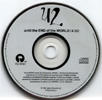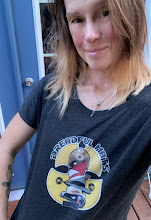I have never understood why (some) men are so threatened by feminism, by women having equal rights. (Why not pass the ERA? Makes no sense. The “avoiding big government” excuse is, at best, a joke and misses the point.) Maybe these men are also very competitive with and threatened by other men, so they want to avoid an even playing ground with the other half of humanity as well. But I don’t think that really explains the actions and words of these type of men.
The July 24, 2005, New York Times Book Review included a thoughtful
essay by Naomi Wolf, one of my favorite feminists (And one of my generation – Generation X, of course – which is getting rarer, though not as rare as feminists of the generation now in their teens.), author of
The Beauty Myth and
Misconceptions. In this essay, “
She Stoops to Conquer,” Wolf examines how Edward Klein reveals his fears and fantasies about the relationship between men and women, in his
book on Hillary Clinton. And she parallels his treatment of Clinton with the treatment of Mary Wollstonecraft two centuries ago. These two women share similar personal histories, but also were derided by men as being unfeminine, sexually predatory, frigid, and lesbian (as Wolf writes, “A neat trick for any one woman to accomplish.”)
Wolf is so damn good at what she does. Wow. She is well informed, she writes clearly and persuasively, and she makes connections that are compelling – noticing dark, manipulative things that undermine or outright attack women that many of us might overlook, such as when she points out that Klein writes “It all went to prove that Bill Clinton could ‘not even control his own wife.’” Why should he? Is he her keeper? Are they not equals? How nasty. Yet one might miss it in the midst of reading and not react to the insidiousness.
I find it especially telling that Klein is, reportedly (granted, I have not read his book), overly interested not only in Clinton’s sexuality but also in her appearance: She used to be attractive, now she is not. And why does this matter? Is this yet another attack on a women’s attractiveness as she ages to undermine her independence and influence? That is such a tired strategy – but one that won’t go away it seems.
Even some women assume that appearance and style are acceptable reasons to criticize or even hate other women – but only a few women do this (and, we are always told, probably feel really lousy about themselves – so we should perhaps feel sorry for them).
This may be a leap, but I am reminded of a bit in Helen Fielding’s newish book,
Olivia Joules and the Overactive Imagination (not a great book – but it was fun enough to keep me reading). With the voice of her main character, Fielding writes,
"If a woman was on the Girls’ Team, she could be as beautiful, intelligent, rich, famous, sexy, successful and popular as f***, and you’d still like her. Women on the Girls’ Team had solidarity. They were conspiratorial and brought all their f***-ups to the table for everyone to enjoy. Undercover B****es were competitive: they showed off, tried to put others down to make themselves look good, lacked humor and a sense of their own ridiculousness, said things that were okay on the surface but were actually designed to make you feel really bad, couldn’t bear it when they weren’t getting enough attention, and they flicked their hair. Men didn’t get all this. They thought women took against each other because they were jealous. Quite tragic, really."
I believe the Undercover B**** type is even rarer than some believe. Most women tend toward supporting other women. And women must stick together and support each other – avoid being critical for all the wrong reasons. I may not love Hillary Clinton, but my issues with her have to do with her middle-of-the road politics – she is not doing enough or challenging the status quo, the man, the powers that be, the (striving to be) all-powerful Bush empire. I couldn’t care less when she looks like, or if she is feminine enough, or bakes cookies, or changed her name when she married. What trivial things that are distracting us from substantial issues. No one would apply these same questions to men in the same position (ah, the old complaint, but obviously somewhat ignored in our society).
Feminism has never has meant hating men, being a working mom as opposed to a stay-at-home one, shaving or not shaving certain body hair – these issues are beside the point and up to the individual woman. And that is the whole point, people: Women are equal to men and must have the same individual choices as men, without being attacked for meaningless, insidious reasons that distract and undermine.

